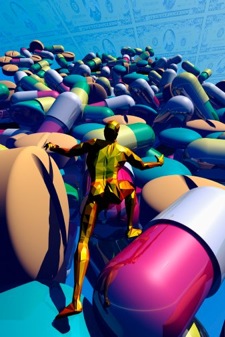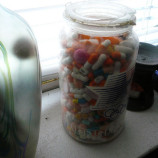The Senate just released 88 pages of a confidential 270+ page marketing plan by Forest Laboratories, created in 2004 and focused on how to get doctors to prescribe the antidepressant Lexapro over similar but cheaper alternatives such as Celexa. The New York Times notes that the line between marketing and education seems to be heavily blurred, which may not surprise you. There are, however, two interesting notes for consumers who may be taking Lexapro.
psychiatry

Sadness Makes You Spend More
Is [it] a biologically driven disease of the brain, a learned habit run amok, an addiction in its own right or a symptom of the other dysfunctions—most notably depression—that so often accompany it?

Modern Psychiatry: Brought To You By Selfless Pharmaceutical Companies
Psychiatry is nothing more than a well-funded front for big pharma, according to lawmakers investigating the field’s premier organization, the American Psychiatric Association. Unlike psychologists, psychiatrists can write prescriptions, giving pharmaceutical companies a powerful incentive to lavishly subsidize both their lifestyle and profession.

Exercise Helps Depression As Well As Meds, Says New Study
If you’re blue, but not into treatments that require a prescription, hit the gym. In a recent study of 202 depressed adults, researchers found that those who participated in “group-based exercise therapy” showed the same results as those treated with antidepressants, while those who exercised at home showed slightly less improvement, and those who were given a placebo pill remained depressed.

Did The Gov's Anti-Meds Warnings Work Too Well?
Some psychiatrists are claiming that the government’s “black box” warnings on the risks of antidepressants for teenagers have worked too well, to the point that they’ve scared off worried parents and lawsuit-sensitive doctors, leaving depressed teens undiagnosed and untreated. The rate of suicide among children and young adults jumped 8% in 2004, one year after the warnings went into effect—it was the biggest one-year spike in suicides for that demographic in 15 years, and psychiatrists worry it was caused in part by the 22% drop in prescriptions of antidepressants.

Obsessive Shopping: A Disease?
Following a new study published in this months American Journal of Psychiatry, The American Psychiatric Association is considering whether to add obsessive shopping to the DSM as a classifiable medical disorder. According to the study, more than 10 million Americans may be afflicted, including people like Lucille Schneck:


